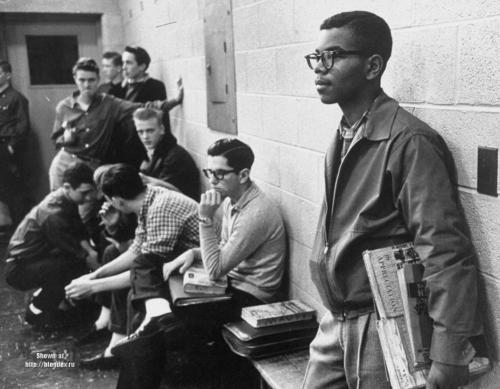
70 years old.
ruisimples CVP
ruipshhh








beautifulpicturesofhealthyfood:
Vegan Vegetable Wraps - Critter Baugh not only shreds in the ocean, but he also has some serious skills in the kitchen. As a personal chef and caterer, specializing in vegan, vegetarian, and raw cooking, Critter takes us out to his organic garden to get the fixin’s for his tasty wraps. See VIDEO.
ruifala sério! vale a pena ver.

China and the United States are both among the countries that execute the most prisoners annually—but only one of them has ever had a TV talk show dedicated to presenting the death row inmates in a personal way. (According to Amnesty International, China executes the most people by more than an order of magnitude over its #2 competition, Pakistan. The United States is #6 on the list.)
From 2006 to 2012, the Henan Legal Channel in China’s landlocked Henan province ran a weekly TV show called Interviews Before Execution, with an appealing host named Ding Yu, who became something of a star because of the show. She has interviewed more than 200 inmates on the show. In March 2012, BBC Two, on its This World series, aired an hour-long documentary on Interviews Before Execution; with its typical light touch, the Chinese authorities, fearful of embarrassment in the international arena, quickly moved to cancel the show.
In China, citizens can be executed for any one 55 offenses, including endagering public security and “economic crimes” such as embezzlement, but Interviews Before Execution focuses almost entirely on brutal murder cases. Most of the prisoners are glumly contrite, resigned to their fate, inarticulate about the motives that led to the crimes. Providing an instructive snapshot into China’s sexual mores was Ding Yu’s extended interview with Bao Rongting, a homosexual man who was convicted of murdering his mother. In China, homosexuality was a criminal offense as late as 1999. The Bao Rongting episodes of Interviews Before Execution were a huge ratings success. Since 2007 a new safeguard has been introduced: all capital cases must be sent to the Supreme Court for review—it does happen that they occasionally return cases to the lower courts for further investigation.

Interviews Before Execution is a fascinating mixture of good, old-fashioned reporting, TV sensationalism, and an undefinable quality that is uniquely poignant and human. In its tone, the show feels like a cross between America’s Most Wanted and a Barbara Walters special. Regardless of one’s feelings about the death penalty—count me against—it’s difficult not to think that the show’s positive effects outweight its negative ones. As none other than Albert Camus pointed out (in “Reflections on the Guillotine”), if you argue for the death penalty because of its deterrent effects, it’s a contradiction to conduct the executions and everything surrounding them far from public view, as is done in the United States. Whatever your position, the show has featured some incredibly compelling television, and even if the viewers’ reactions may feel comparable to rubber-necking, the show does permit the audience to get to know convicted murders not as statistics but as complex members of the human race.
The BBC2 documentary is linked below; it’s one of the most interesting and powerful hours of TV I can remember watching.

Fun photos of Henry Rollins (and Ian MacKaye) back when he worked at a Häagen-Dazs, circa 1981.
Apparently Henry was a model employee at his Washington D.C. area Häagen-Dazs franchise. He was promoted to assistant manager!
More images available like this in the book Punk Love by Susie J. Horgan.
Previously on Dangerous Minds:
Listen to Henry Rollins and Ian MacKaye’s 2-hour DJ set on KCRW



Via BuzzFeed

As an employee of Metal Hammer magazine in the UK, James Sherry embodies the peculiarly diverse terrain of fandom that Nirvana staked out for themselves, even before they crossed over to massive mainstream success. James Hetfield of Metallica had expressed admiration for Nirvana way back when Bleach was their only release. Nirvana always thought of themselves as punk, but their music ended up being viewed as something of a supercharged variant of catchy power-punk that appealed to metal folks as well.
Here we have three separate Nirvana interviews conducted by Sherry; all together, they add up to nearly an hour. The interviews catch Nirvana at three very different stages of their career. In November of 1990 Nirvana was riding the modest success of Bleach; in the summer of 1991 they were ready to release Nevermind and they knew they had something special on their hands; by 1992 they had already become superstars and were dealing with that. By the time the last interview rolled around, Nirvana had been named Metal Hammer’s “Best New Band,” which was just really amusing. Among other things, they discuss their willingness to pursue an idea that had been floated in 1991 of touring with Guns N’ Roses.
These interviews have been available on CD since 2004, but this is the first time that they’ve been made available on the Internet.
Even before Nevermind people were clamoring for their autographs. According to Kurt:
At first we were floored by it, we couldn’t believe that people, punk rock—supposedly punk rock people wanted autographs. It seems like the underground has simply reversed itself. There’s still a lot of good, vital things going on in it, but the rock star part of it—I don’t necessarily think it can simply be thought of as, we’re rock stars and they want our autographs. It’s just that they appreciate our music so much that they wanted something extra—it’s an excuse to come up and talk to us, also. I’d rather just talk to somebody as give them an autograph. What usually when I do give autographs I just take a pen and put an X on their program. ...
It’s hard to even tell, it’s hard to tell the difference between punks and metal kids anymore at our shows, especially in the States, because it seems like there’s this new breed of people who just naturally like both of the styles, and a lot of them have, a lot of them dress like Mudhoney … and they just like rock and roll and they don’t even care to be classified anymore, so it’s like, it’s a mixture of the rock star and the punk rock thing at the same time, and it’s not as boring as the crossover thing.
If you’re a big Nirvana fan, you are going to want to hear these interviews, for sure!
November 1990 interview (26:24):
Summer 1991 interview (21:11):
1992 interview (10:47; Novoselic only):
(via NME)
Emily's post yesterday about fire extinguishers reminded me that you can never be too careful in the kitchen. I would say the same goes for smoke alarms. I (guiltily) admit to sometimes disabling my smoke alarm when I cook just to avoid setting it off and having to deal with the annoying, unstoppable beeping. But this new smoke and carbon monoxide detector from Nest is pretty great. For one, it talks to you before it starts beeping!
ruiword up!
You Have a Perfect Excuse
New Yorker explains the science
JULY 22, 2013
WHY SUMMER MAKES US LAZY
POSTED BY MARIA KONNIKOVA
A few quotes:
A 2008 study using data from the American Time Use Survey found that, on rainy days, men spent, on average, thirty more minutes at work than they did on comparatively sunny days. In 2012, a group of researchers from Harvard University and the University of North Carolina at Chapel Hill conducted a field study of Japanese bank workers and found a similar pattern: bad weather made workers more productive, as measured by the time it took them to complete assigned tasks in a loan-application process………
Instead of focussing on their work, they focussed on what they’d rather be doing—whether or not it was actually sunny or rainy outside (though the effect was stronger on sunny days). The mere thought of pleasant alternatives made people concentrate less……….
. In 1994, Gerald Clore, a pioneer in researching how ambient mood-altering phenomena affect cognition and judgment, found that pleasant weather can often lead to a disconcerting lapse in thoughtfulness. Clore’s team approached a hundred and twenty-two undergraduates on days with either good or bad weather and asked them to participate in a survey on higher education. The better the weather, the easier it was to get the students to buy into a less-than-solid argument: on days that were sunny, clear, and warm, people were equally persuaded by both strong and weak arguments in favor of end-of-year comprehensive exams. When the weather was rainy, cloudy, and cold, their critical faculties improved: in that condition, only the strong argument was persuasive. …
In a 2013 study of perceived well-being, the economist Marie Connolly found that on days when the temperature rose above ninety degrees, the negative impact on happiness levels was greater than the consequences of being widowed or divorced……
Maybe best of all, blistering heat does give us a perfectly good reason to eat ice cream: studies have shown again and again that blood glucose levels are tied to cognitive performance and willpower. A bite of something frozen and sweet, boosting depleted glucose stores, might be just what a brain needs as the temperature spikes.
One of the key issues is motivation: when the weather is unpleasant, no one wants to go outside, but when the sun is shining, the air is warm, and the sky is blue, leisure calls. A 2008 study using data from the American Time Use Survey found that, on rainy days, men spent, on average, thirty more minutes at work than they did on comparatively sunny days. In 2012, a group of researchers from Harvard University and the University of North Carolina at Chapel Hill conducted a field study of Japanese bank workers and found a similar pattern: bad weather made workers more productive, as measured by the time it took them to complete assigned tasks in a loan-application process.
When the weather improved, in contrast, productivity fell. To determine why this was the case, the researchers assigned Harvard students data entry on either sunny or rainy days. The students were randomly assigned to one of two conditions: before starting to work, they were either shown six photographs of outdoor activities in nice weather, such as sailing or eating outdoors, or were asked to describe their daily routines. The researchers found that participants were less productive when they’d viewed pleasant outdoor photographs. Instead of focussing on their work, they focussed on what they’d rather be doing—whether or not it was actually sunny or rainy outside (though the effect was stronger on sunny days). The mere thought of pleasant alternatives made people concentrate less.
But each season has its share of attractive days—and a skier’s mind would likely have many opportunities to wander in the dead of winter. There’s evidence, however, that in summer, our thinking itself may simply become lazier. In 1994, Gerald Clore, a pioneer in researching how ambient mood-altering phenomena affect cognition and judgment, found that pleasant weather can often lead to a disconcerting lapse in thoughtfulness. Clore’s team approached a hundred and twenty-two undergraduates on days with either good or bad weather and asked them to participate in a survey on higher education. The better the weather, the easier it was to get the students to buy into a less-than-solid argument: on days that were sunny, clear, and warm, people were equally persuaded by both strong and weak arguments in favor of end-of-year comprehensive exams. When the weather was rainy, cloudy, and cold, their critical faculties improved: in that condition, only the strong argument was persuasive. Clore and his colleagues concluded that pleasant weather led people to embrace more heuristic-based thinking—that is, they relied heavily on mental shortcuts at the expense of actual analysis.
Summer weather—especially the muggy kind—may also reduce both our attention and our energy levels. In one study, high humidity lowered concentration and increased sleepiness among participants. The weather also hurt their ability to think critically: the hotter it got, the less likely they were to question what they were told.
The shift toward mindlessness may be rooted in our emotions. One common finding is a link between relative sunshine and happiness: although people who live in sunnier places, like Southern California, are no happier than those who live in the harsher conditions of the Midwest, day-to-day variations in sunshine make a difference. People get happier as days get longer and warmer in the approach to the summer solstice, and less happy as days get colder and shorter. They also report higher life satisfaction on relatively pleasant days. The happiest season, then, is summer.
A good mood, generally speaking, has in turn been linked to the same type of heuristic, relatively mindless thinking that Clore observed in his pleasant-weather participants. On the flip side, a bad mood tends to stimulate more rigorous analytical thought. Weather-related mood effects can thus play out in our real-life decisions—even weighty ones. In one recent project, the psychologist Uri Simonsohn found that students were more likely to enroll in a university that was famous for its academic rigor if they visited on days that were cloudy. When the weather turned sour, he concluded, the value they placed on academics increased.
There’s a limit, however, to heat’s ability to boost our mood: when temperatures reach the kind of summer highs that mark heat waves all over the world, the effect rapidly deteriorates. In a 2013 study of perceived well-being, the economist Marie Connolly found that on days when the temperature rose above ninety degrees, the negative impact on happiness levels was greater than the consequences of being widowed or divorced.
Conversely, the effects of heat on our brains aren’t entirely negative. Many of the behaviors that psychologists study follow a so-called inverted-U pattern: as one factor steadily increases, a related behavior improves, plateaus, and then starts to deteriorate. A famous example of this is the Yerkes-Dodson curve, which charts the effect of stress on how well someone performs a given task. If we experience too little stress, or too much, our performance suffers. Like Goldilocks, we want to get it just right. Similarly, our cognitive abilities seem to improve up to a certain temperature, and then, as the temperature continues to rise, quickly diminish. An early study suggested that the optimal temperature hovered around seventy-two degrees Fahrenheit. A more recent review of the literature shows a target of twenty-seven degrees Celsius, or roughly eighty-one degrees Fahrenheit. (An important caveat, however, is that neither of these studies take humidity or sunshine into account, two major factors when it comes to assessing the influence of summer weather on behavior.)
Maybe best of all, blistering heat does give us a perfectly good reason to eat ice cream: studies have shown again and again that blood glucose levels are tied to cognitive performance and willpower. A bite of something frozen and sweet, boosting depleted glucose stores, might be just what a brain needs as the temperature spikes.
Illustration by Edwin Fotheringham.
((Contrast with this, exhibit A for how we need science.
How those who lack acience try to overcome it: http://www.bodylovewellness.com/))

skull and sword on calf. zach grimm. holy ground tattoos. buffalo,ny
zachxgrimmtattoos.tumblr.com
instagram: zachxgrimm

"Standing Tall Amid the Glares" by Paul Schutzer.
Lewis Cousins, age 15, the only African American student in the newly desegregated Maury High School, standing alone. 1959, Norfolk, VA.

Heroes Inc. Presents “CANNON”
Wallace Wood, 1969